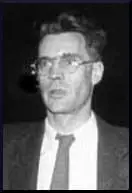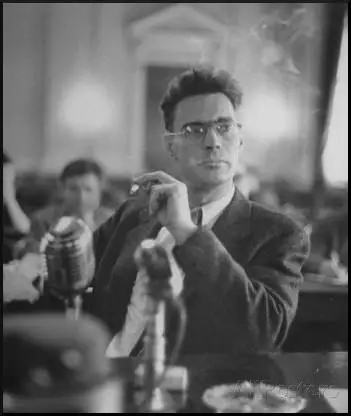Julian Wadleigh

Julian Wadleigh, the son of a Episcopal minister, was born in Greenfield, Massachusetts in 1904. He was mainly educated in England and obtained a BCS from the London School of Economics and a MA from Oxford University. While in England he was a supporter of the Labour Party.
Wadleigh returned to the United States in 1929 and spent a year at the University of Chicago. In 1930, Wadleigh went to work for the Federal Farm Board. Two years later he was transferred to the Department of Agriculture. He developed left wing views and in 1931 became a member of the Socialist Party of America.
One of his friends during this period, Whittaker Chambers, commented: "Wadleigh seemed to me one of the oddest people I ever knew. He was an Oxford man. He always went bareheaded on principle and he affected a careful disorder in his dress. After some argument, Carpenter finally prevailed upon him to buy a hat, but he seldom wore it. My recollection of him is as very youthful-looking, with distracted hair and thick-lensed glasses. He was both highly sensitive and informed and, as time was to show, courageous. As sometimes happens with rather owlish young men, there was a puckish streak in him too."
Julian Wadleigh & New Deal
Julian Wadleigh joined other left-wing socialist supporters of the New Deal in forming the Harold Ware Group. Established by Harold Ware, the son of Ella Reeve Bloor, the discussion group included Alger Hiss, Nathaniel Weyl, Laurence Duggan, Harry Dexter White, Nathan Witt, Marion Bachrach, Henry H. Collins, Lee Pressman and Victor Perlo. Ware was working very close with Joszef Peter, the "head of the underground section of the American Communist Party." It was claimed that Peter's objective was for its members to "influence policy at several levels" as their careers progressed".
Susan Jacoby, the author of Alger Hiss and the Battle for History (2009), has pointed out: "Chambers, among others, would testify that the eventual penetration of the government was the ultimate aim of a group initially overseen in Washington by Hal Ware, a Communist and the son of Mother Bloor... When members did succeed in moving up the government ladder, they were supposed to separate from the Ware organization, which was well known for its Marxist participants. Chambers was dispatched from New York by underground Party superiors to supervise and coordinate the transmission of information and to ride herd on underground Communists - Hiss among them - with government jobs."
Whittaker Chambers later explained in Witness (1952): "The Washington apparatus to which I was attached led its own secret existence. But through me, and through others, it maintained direct and helpful connections with two underground apparatuses of the American Communist Party in Washington. One of these was the so-called Ware group, which takes its name from Harold Ware, the American Communist who was active in organizing it. In addition to the four members of this group (including himself) whom Lee Pressman has named under oath, there must have been some sixty or seventy others, though Pressman did not necessarily know them all; neither did I. All were dues-paying members of the Communist Party. Nearly all were employed in the United States Government, some in rather high positions, notably in the Department of Agriculture, the Department of Justice, the Department of the Interior, the National Labor Relations Board, the Agricultural Adjustment Administration, the Railroad Retirement Board, the National Research Project - and others."
Named as Soviet Spy
In March 1936, Wadleigh transferred to the State Department, where he worked at the Trade Agreements division. During this period he passed documents to Soviet agents. However, he became very concerned with the Great Purge that was taking place in the Soviet Union. He brought this up with his controllers in the United States. In August 1939 Joseph Stalin and Adolf Hitler agreed to sign the Nazi-Soviet Pact. Wadleigh was so upset by this decision he refused to cooperate with Soviet agents.
In August 1939, Isaac Don Levine arranged for Whittaker Chambers to meet Adolf Berle, one of the top aides to President Franklin D. Roosevelt. After dinner Chambers told Berle about government officials spying for the Soviet Union: "Around midnight, we went into the house. What we said there is not in question because Berle took it in the form of penciled notes. Just inside the front door, he sat at a little desk or table with a telephone on it and while I talked he wrote, abbreviating swiftly as he went along. These notes did not cover the entire conversation on the lawn. They were what we recapitulated quickly at a late hour after a good many drinks. I assumed that they were an exploratory skeleton on which further conversations and investigation would be based."
According to Levine the list of "espionage agents" included Wadleigh, Alger Hiss, Donald Hiss, Laurence Duggan, Lauchlin Currie, Harry Dexter White, John Abt, Nathan Witt, Lee Pressman, Noel Field and Frank Coe. Chambers also named Joszef Peter, as being "responsible for the Washington sector" and "after 1929 the "head of the underground section" of the American Communist Party.
Julian Wadleigh & Alger Hiss
Soon after the outbreak of the Second World War Wadleigh went to work for Leo Pasvolsky, Special Assistant to the Secretary of State Cordell Hull on the problems of postwar economic policy. In 1943, Wadleigh was transferred to the Office of Foreign Economic Coordination, where he worked on economic matters pertaining to the future occupation of Italy. In May 1946, he joined the United Nations Relief and Rehabilitation Administration (UNRRA).

Activities Committee in December, 1948.
In December 1948, Wadleigh confessed to the House of Un-American Activities Committee that from early 1936 to March 1938 he had passed State Department documents to Whittaker Chambers. In May 1949 Wadleigh gave evidence against Alger Hiss during his perjury trial. Wadleigh admitted that he was part of the same spy network as Chambers and Hiss. He did this because of "the failure of the Social Democrats in Germany to offer effective resistance against Hitler, the growing power of the Nazis in Germany and of the ruling group in Japan, and the Fascists in Italy.” Wadleigh explained that he saw “the Communists and Soviet Union” as “offering the only effective opposition.” Federal prosecutor Thomas Murphy pointed out that Wadleigh only wanted to stop the rise of fascism; "we all came to hate it, but he saw it earlier."
Julian Wadleigh died in 1994.
Primary Sources
(1) Whittaker Chambers, Witness (1952)
Wadleigh seemed to me one of the oddest people I ever knew. He was an Oxford man. He always went bareheaded on principle and he affected a careful disorder in his dress. After some argument, Carpenter finally prevailed upon him to buy a hat, but he seldom wore it. My recollection of him is as very youthful-looking, with distracted hair and thick-lensed glasses. He was both highly sensitive and informed and, as time was to show, courageous. As sometimes happens with rather owlish young men, there was a puckish streak in him too. I think that nothing sums up that side of Wadleigh quite so well as a name he took during the second Hiss trial. To avoid the press, Wadleigh registered at his hotel as Jasper Q. Sprigg.
Shortly after I met him, Wadleigh was able to transfer from the Agriculture Department to the Trade Agreements Division of the State Department. He soon brought out several small batches of documents to be photographed. For Peters had had his usual motive in arranging these new connections, and he was once more stirred to photography. Abel Gross also brought out some documents from the Bureau of Standards. I must have photographed them, probably at Alger Hiss's, for at that time the apparatus had no independent facilities for such work in Washington.
